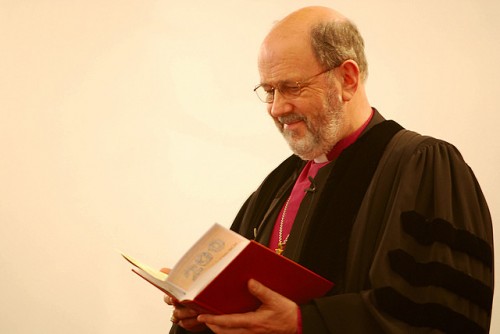 Some words of Virgil Vaduva, quoted in a post The Toxic Fruit of Legalism by Martin Trench:
Some words of Virgil Vaduva, quoted in a post The Toxic Fruit of Legalism by Martin Trench:
He killed fifty-seven people; banished seventy-six. Confiscated property of political and theological enemies; took power by public revolt and despotism; he ruled with an iron fist. … his name was John Calvin; an incredible attorney, stellar theologian, a tyrant and a murderer. …
There is more in Martin’s post, and a lot more in Vaduva’s 2006 article, The Right to Heresy. Vaduva explains how Calvin came to exert supreme power in the city state of Geneva, dominating the elected council in a way rather like how the Ayatollahs dominate the elected government in today’s Iran. And just like the Ayatollahs Calvin and his Consistory ruthlessly enforced public and private morality, with their officers randomly searching people’s bodies and homes for anything which didn’t meet their absolute standards. When the heretic Servetus arrived in Geneva, he wasn’t even given a fair trial before being burned to death.
Now I’m sure that today’s Calvinists would write that they reject this kind of behaviour. After all, so did Calvin, when he wrote, before he arrived in Geneva, in the first edition of his Institutes of the Christian Religion (as quoted by Vaduva – these words are not in later editions but may be footnoted in the Battles translation for which I give the Amazon link):
(as quoted by Vaduva – these words are not in later editions but may be footnoted in the Battles translation for which I give the Amazon link):
It is criminal to put heretics to death. To make an end of them by fire and sword is opposed to every principle of humanity.
But when Calvin had acquired the power to do so, he put a heretic to death. “Absolute power corrupts absolutely.”
Calvinists insist that theirs is a religion of grace, not of works, and that that is what Calvin preached. And indeed that is true as far as justification is concerned. But when it comes to sanctification, there seems to be no room for grace in Calvin’s scheme, but only for legalism. Jesus said
If you hold to my teaching, you are really my disciples. 32 Then you will know the truth, and the truth will set you free.
John 8:31-32 (NIV 2011)
Paul exhorted the Galatians:
It is for freedom that Christ has set us free. Stand firm, then, and do not let yourselves be burdened again by a yoke of slavery.
Galatians 5:1 (NIV 2011)
But Calvin brought Jesus’ disciples in Geneva (as well as those who believed only outwardly) under a new yoke of slavery, a new law of his own devising. As such his teaching was the very opposite of Christian.
Now I am not suggesting that all of today’s Calvinists are teaching this kind of legalism. Some clearly are not. But it seems very strange to me that, while claiming to be evangelical Christians, they revere so highly someone whose teachings and practice were so antithetical to the gospel message.
P.S. Please don’t think that I endorse the teachings on Virgil Vaduva’s site Planet Preterist, as made more explicit on a linked FAQ page. This site is promoting full preterism, not the partial preterism of Martin Trench which I largely accept. Full preterism includes the teaching that the second coming of Jesus will be
[not] a physical and bodily return of Jesus [but] a return of his spiritual presence
– and that this spiritual second coming took place in AD 70. Thus they have made the same manoeuvre as the Jehovah’s Witnesses and more recently Harold Camping: because eschatological events did not happen in a visible way when their understanding of the Bible says they should have happened, these groups have reinterpreted the events as spiritual and therefore invisible, rather than accept that they may have misunderstood the Bible. That, I would suggest, is one of the clear marks of a false teacher – but not as serious as Calvin’s error of turning Christian freedom into fearful bondage.
 At Reclaiming the Mind Dan Wallace offers part 1 of a review of NIV 2011. This first part is in fact a review of the history of English Bible translations, mostly from 1885 to the present day. In general this is the kind of excellent work one would expect from Wallace. See also my brief post at Better Bibles Blog.
At Reclaiming the Mind Dan Wallace offers part 1 of a review of NIV 2011. This first part is in fact a review of the history of English Bible translations, mostly from 1885 to the present day. In general this is the kind of excellent work one would expect from Wallace. See also my brief post at Better Bibles Blog.




 The only significant strong negative reaction to the NIV 2011 that I have seen has come from
The only significant strong negative reaction to the NIV 2011 that I have seen has come from 
 In case anyone is confused, the Calvin I was referring to in my post
In case anyone is confused, the Calvin I was referring to in my post 
